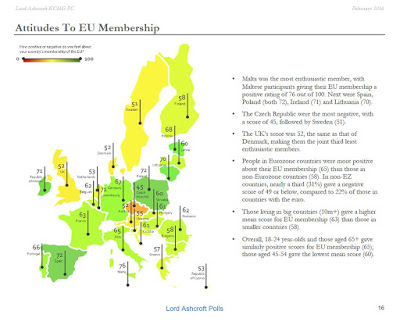Summary:
British exit from the European Union (EU) is more radical than Grexit, which basically was exit from the eurozone (EZ), the currency area, but not the union. Wynne Godley, for example, was against the euro (see this), but he was not against the EU. Quite the opposite, he was pro-Europe, as were many progressive economists, several connected to Labor (Lord Eatwell being an example). The whole isue now became relevant, since David Cameron, the prime minister, set the date for a referendum on Brexit for June 23rd. Map below shows the degrees of euroskepticism (as in EU membership, not EZ) around Europe. Note that in the UK there is a significant amount of euroskeptics, more than in the parts of Europe that have suffered from the problems with the monetary union (source here). The UK and the countries with more developed welfare systems in Northern Europe (Denmark, Sweden, Finland) tend to have a less favorable view of the European Union.I'll discuss the pros and cons, from an economic perspective, of EU membership in another post. I do feel like Wynne that, while EZ membership is not necessarily good (at least with the current fiscal rules), EU membership is better than the alternative.
Topics:
Matias Vernengo considers the following as important: Brexit, Eatwell, Godley, Grexit
This could be interesting, too:
British exit from the European Union (EU) is more radical than Grexit, which basically was exit from the eurozone (EZ), the currency area, but not the union. Wynne Godley, for example, was against the euro (see this), but he was not against the EU. Quite the opposite, he was pro-Europe, as were many progressive economists, several connected to Labor (Lord Eatwell being an example). The whole isue now became relevant, since David Cameron, the prime minister, set the date for a referendum on Brexit for June 23rd. Map below shows the degrees of euroskepticism (as in EU membership, not EZ) around Europe. Note that in the UK there is a significant amount of euroskeptics, more than in the parts of Europe that have suffered from the problems with the monetary union (source here). The UK and the countries with more developed welfare systems in Northern Europe (Denmark, Sweden, Finland) tend to have a less favorable view of the European Union.I'll discuss the pros and cons, from an economic perspective, of EU membership in another post. I do feel like Wynne that, while EZ membership is not necessarily good (at least with the current fiscal rules), EU membership is better than the alternative.
Topics:
Matias Vernengo considers the following as important: Brexit, Eatwell, Godley, Grexit
This could be interesting, too:
Matias Vernengo writes Lance Taylor (1940-2022) and his legacy
Frances Coppola writes The dismal decade
Matias Vernengo writes Fourth Godley-Tobin Lecture: Marc Lavoie on Godley vs Tobin on Monetary Theory
Mike Norman writes My new podcast episode is out
British exit from the European Union (EU) is more radical than Grexit, which basically was exit from the eurozone (EZ), the currency area, but not the union. Wynne Godley, for example, was against the euro (see this), but he was not against the EU. Quite the opposite, he was pro-Europe, as were many progressive economists, several connected to Labor (Lord Eatwell being an example). The whole isue now became relevant, since David Cameron, the prime minister, set the date for a referendum on Brexit for June 23rd. Map below shows the degrees of euroskepticism (as in EU membership, not EZ) around Europe.
Note that in the UK there is a significant amount of euroskeptics, more than in the parts of Europe that have suffered from the problems with the monetary union (source here). The UK and the countries with more developed welfare systems in Northern Europe (Denmark, Sweden, Finland) tend to have a less favorable view of the European Union.
Note that in the UK there is a significant amount of euroskeptics, more than in the parts of Europe that have suffered from the problems with the monetary union (source here). The UK and the countries with more developed welfare systems in Northern Europe (Denmark, Sweden, Finland) tend to have a less favorable view of the European Union.
I'll discuss the pros and cons, from an economic perspective, of EU membership in another post. I do feel like Wynne that, while EZ membership is not necessarily good (at least with the current fiscal rules), EU membership is better than the alternative.

